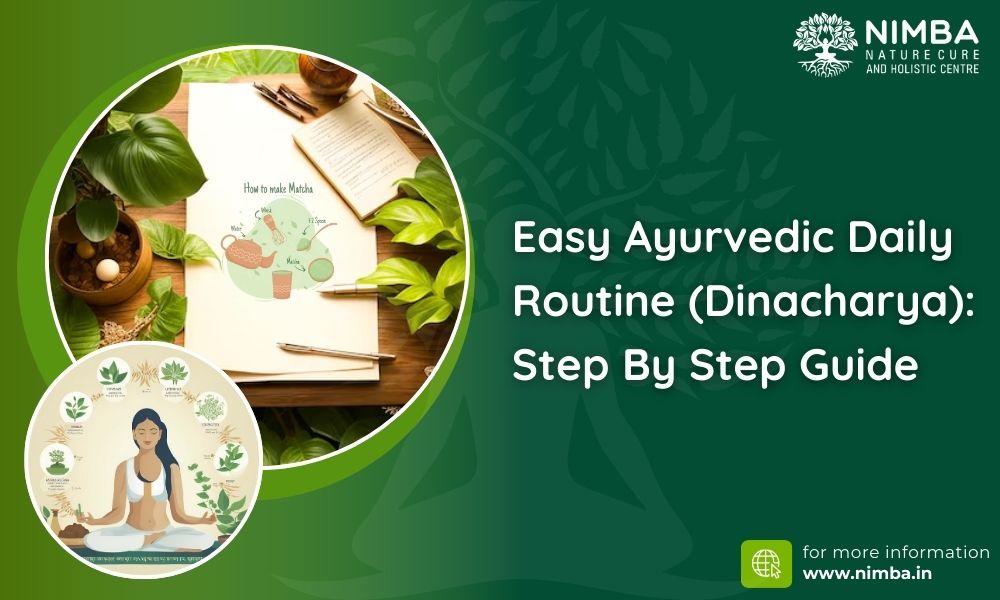Easy Ayurvedic Daily Routine (Dinacharya): Step By Step Guide
By: Nimba - July 18, 2024
Ayurveda is an ancient medical science originated in India and has lot to tell about managing our health and being fit in life. Another concept is Dinacharya, which means daily hygiene schedule that serves as a guideline on how to synchronise the human organism with natural cycles. Lifestyle management through Ayurveda offers the opportunity to improve one’s Personal Daily Routine. In this blog I will be describing an easily-followed process of how to incorporate Ayurvedic daily practice into a person’s life.
The Importance of Dinacharya
Collectively, Ayurveda also aims at having elderly people’s routines and schedules in harmony with particular natural cycles. Dinacharya maintains the rhythm of the body, sharpens the brain faculties, and keeps the passions under control. It is designed to cleanse the body of toxins, prevent disease, and maintain balance among the body’s doshas: Hypothetically, the three energies are Vata, Pitta, and Kapha.
Steps on How to Create an Ayurvedic Daily Schedule
1. Wake Up Early
Timing: In the morning specifically, it is preferred that it is done before sunrise that is from 5 am – 6 am.
Performing a routine during the morning parts the human body with a natural body clock. This time is regarded as untainted, void and appropriate for meditating or reflecting on one’s conscience.
2. Oral Hygiene
Tongue Scraping: Scrape the tongue with a scraper in order to dislodge toxins and bacteria that accumulate there and worsen digestion and breath. Oil Pulling: Chew a tablespoon of sesame or coconut oil in the mouth for 10-15 mins to help to detoxify teeth as well as gums. Brushing: Clean your teeth with natural toothpaste to finish up the dental care.
3. Hydrate
Drink Warm Water: Start your day by drinking a glass of warm water. This helps flush out toxins and stimulates digestion.
4. Elimination
Regular Bowel Movements: According to ayurveda, daily regular bowel movements is part of the ayurvedic routine. Warm water and certain kinds of activities involving the muscles can also facilitate movement of bowels.
5. Self-Massage (Abhyanga)
Oil Massage: Massage the body with warm sesame or coconut oil, start it from your hands going up to the head. Abhyanga strengthens and softens the skin, the oil improves blood circulation and brings relaxation to the nervous system. Rub the oil from your head to toe where the circular movements should be performed on the joints while the long strokes on the limbs.
6. Bathing
Warm Shower: Bath the body using warm water to wash – rinse off the skin after the massage to eliminate any remainder of the oil. This helps in rejuvenating the body and the brain gets a break or a booster from being overworked.
7. Yoga and Meditation
Practice Yoga: Take some time to do some light yoga to help elongate the muscles and work on building some muscle. Stress and arthritis are also reduced because yoga enhances the flexibility, balance and sharpness of one’s mind. Meditate: Take time to meditate; the time should range between 10-15 minutes to help in calming the mind.
8.Breakfast
Nutritious Meal: That is why you should take a light but healthy meal in the morning that would not harm your dosha. Add fruits, also whole grain products and Dairy products if you are in a position to maintain your constitution.
9. Work and Daily Activities
Stay Mindful: In your job and throughout the day wear mindfulness to your actions. Ensure you take regular intervals to rest and make it a point to drink water and or any other healthy beverage at intervals.
10. Lunch
Main Meal: Lunch should be the biggest meal because consumption of food is best in the middle of the day due to best digestion. Ensure that you take carbohydrates in the form of grains, green vegetables, proteins and healthy fats.
11. Afternoon Routine
Light Activity: Take a short jog or go for a walk to help in digestion and prevent the feeling of tiredness in the afternoon.
12. Dinner
Early and Light Dinner: Have an early and light dinner, ideally before 7:00 PM. Choose easy-to-digest foods and avoid heavy, rich meals.
13. Evening Routine
Wind Down: Spend the evening relaxing and winding down. Engage in calming activities such as reading or spending time with loved ones.
14. Bedtime
Sleep Routine: Establish a regular bedtime routine. Aim to go to bed by 10:00 PM to ensure you get adequate rest. Prepare for Sleep: Avoid screens and stimulating activities before bed. Practice relaxation techniques like deep breathing or gentle stretching.
Incorporating an Ayurvedic Daily Routine into your life can bring numerous benefits, including improved physical health, mental clarity, and emotional balance. At Nimba Nature Cure, we advocate for holistic wellness approaches that align with natural rhythms and ancient wisdom. By following this step-by-step guide, you can start your journey towards a balanced and harmonious life.
Remember, the key to successfully adopting an Ayurvedic daily routine is consistency. Start with small changes and gradually integrate more practices into your daily life. Embrace the wisdom of Ayurveda and experience the profound transformation it can bring to your overall well-being.
Read also: How to choose the right and best wellness retreat in India





